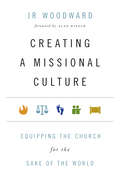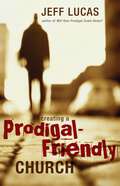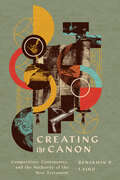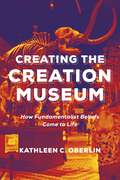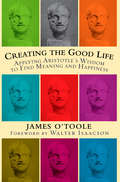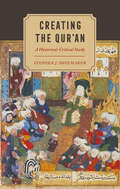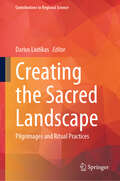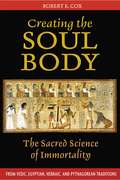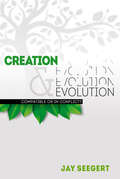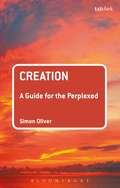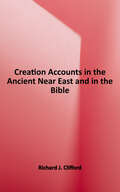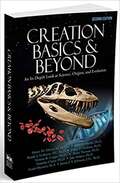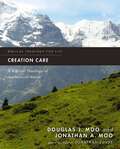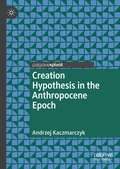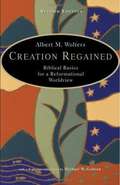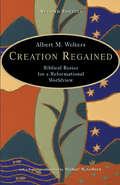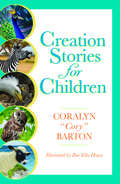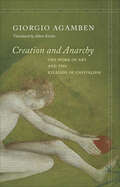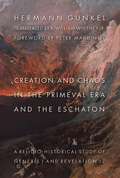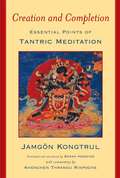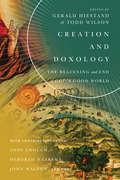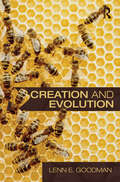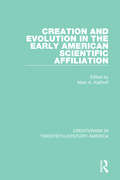- Table View
- List View
Creating a Missional Culture: Equipping the Church for the Sake of the World (Forge Partnership Books)
by JR WoodwardCreating a Missional Culture,
Creating a Prodigal-Friendly Church
by Jeff LucasThis book focuses on the issues behind why people leave the church, how we can retain them, how we reach those who've already gone and the principles of making those who return feel like they belong.
Creating the Canon: Composition, Controversy, and the Authority of the New Testament
by Benjamin P. LairdDespite the profound influence of the New Testament, a variety of questions related to its background and history remain common. Contemporary readers often find the subject of the canon’s origin and formation to be complicated and confusing, while scholars continue to struggle to find agreement about basic elements of the canon’s development. In this engaging study, Benjamin P. Laird explores several misunderstood, disputed, and overlooked topics in order to provide fresh insight and clarity about the canon’s creation and modern relevance. The volume addresses questions such as: Was there a single “original autograph” of each New Testament writing? Who exactly were the “original readers” of the New Testament writings? Did theological controversies play a decisive role in prompting the canon’s formation? How did such a diverse body of writings come together to form a single canonical collection? Is there a basis for the canon’s ongoing authority? Wide-ranging yet accessible, Creating the Canon offers an illuminating treatment of the composition, formation, and authority of the New Testament and serves as a valuable guide to those with limited prior study.
Creating the Creation Museum: How Fundamentalist Beliefs Come to Life
by Kathleen C. OberlinInvestigates how the Christian fundamentalist movement brings Creationism into the mainstream through a Kentucky museum In Creating the Creation Museum, Kathleen C. Oberlin shows us how the largest Creationist organization, Answers in Genesis (AiG), built a museum—which has had over three million visitors—to make its movement mainstream. She takes us behind the scenes, vividly bringing the museum to life by detailing its infamous exhibits on human fossils, dinosaur remains, and more. Drawing on over three years of research at the Creation Museum, where she was granted rare access to AiG’s leadership, Oberlin examines how the museum convincingly reframes scientific facts, such as modeling itself on traditional natural history museums. Through a unique historical dataset of over 1,000 internal documents from creationist organizations and an analysis of media coverage, Creating the Creation Museum shows how the museum works as a site of social movement activity and a place to contest the secular mainstream. Oberlin ultimately argues that the Creation Museum has real-world consequences in today’s polarized era.
Creating the Good Life: Applying Aristotle's Wisdom to Find Meaning and Happiness
by James O'Toole<p>Professionals and business people in midlife are increasingly asking themselves "what's next?" in their careers and personal lives. <p>Creating the Good Life draws on the wisdom of the ages to help contemporary men and women plan for satisfying, useful, moral, and meaningful second halves of their lives.For centuries, the brightest people in Western societies have looked to Aristotle for guidance on how to lead a good life and how to create a good society. <p>Now James O'Toole--the Mortimer J. Adler Senior Fellow of the Aspen Institute--translates that classical philosophical framework into practical, comprehensible terms to help professionals and business people apply it to their own lives and work. <p>His book helps thoughtful readers address some of the profound questions they are currently struggling with in planning their futures: <br>• How do I find meaning and satisfaction? <br>• How much money do I need in order to be happy? <br> • What is the right balance between work, family, and leisure? <br>• What are my responsibilities to my community? <br>• How can I create a good society in my own company? <p>Bridging philosophy and self-help, O'Toole's book shows how happiness ultimately is attainable no matter one's level of income, if one uses Aristotle's practical exercises to ask the right questions and to discipline oneself to pursue things that are "good for us." The book is the basis for O'Toole's new "Good Life" seminar, where thoughtful men and women gather to create robust and satisfying life plans.
Creating the Qur’an: A Historical-Critical Study
by Stephen J. ShoemakerA free open access ebook is available upon publication. Learn more at www.luminosoa.org.Creating the Qur’an presents the first systematic historical-critical study of the Qur’an’s origins, drawing on methods and perspectives commonly used to study other scriptural traditions. Demonstrating in detail that the Islamic tradition relates not a single attested account of the holy text’s formation, Stephen J. Shoemaker shows how the Qur’an preserves a surprisingly diverse array of memories regarding the text’s early history and its canonization. To this he adds perspectives from radiocarbon dating of manuscripts, the linguistic history of Arabic, the social and cultural history of late ancient Arabia, and the limitations of human memory and oral transmission, as well as various peculiarities of the Qur’anic text itself. Considering all the relevant data to present the most comprehensive and convincing examination of the origin and evolution of the Qur’an available, Shoemaker concludes that the canonical text of the Qur’an was most likely produced only around the turn of the eighth century.
Creating the Sacred Landscape: Pilgrimages and Ritual Practices (Contributions to Regional Science)
by Darius LiutikasThis book explores the enduring significance of sacred landscapes in an increasingly globalized world, with a particular focus on the Christian sacred landscape and its connection to pilgrimage and rituals. Drawing on the latest research, it examines the interplay between global societal changes and historical traditions, offering a rich analysis of how sacred spaces shape and reflect cultural and social identities. Through a multidisciplinary lens encompassing cultural geography, anthropology, sociology of tourism, and religious geography, the book illuminates the role of pilgrimage in fostering community identity and preserving historical continuity. By comparing sacred sites and practices across diverse cultural contexts, it provides readers with a deeper understanding of their universal and localized meanings. This work also offers a comprehensive historical perspective, tracing the evolution of sacred landscapes over time and across regions. Accessible and thought-provoking, it invites readers from various disciplines to engage with the cultural, social, and spiritual dimensions of these powerful spaces.
Creating the Soul Body: The Sacred Science of Immortality
by Robert E. CoxOutlines the principles and mechanics of the soul body, the spiritual vehicle that enables individual consciousness to survive the body’s death • Shows that the ancient Vedic, Egyptian, Hebraic, and Pythagorean traditions shared and understood this spiritual practice • Reveals modern science as only now awakening to this ancient sacred scienceAncient peoples the world over understood that individual consciousness is rooted in a universal field of consciousness and is therefore eternal, surviving the passing of the physical body. They engaged in spiritual practices to make that transition maximally auspicious. These practices can be described as a kind of alchemy, in which base elements are discarded and higher levels of consciousness are realized. The result is the creation of a vehicle, a soul body, that carries consciousness beyond physical death.These spiritual preparations are symbolized in the Vedic, Egyptian, and Hebraic traditions as a divine stairway or ladder, a step-by-step path of ascent in which the practitioner raises consciousness by degrees until it comes to rest in the bosom of the infinite, thereby becoming “immortal.” This spiritual process explains the reincarnation of the Dalai Lama, for example, whose reincarnation is confirmed in infancy through physical and spiritual signs, indicating that the consciousness has been carried from one lifetime to the next.In Creating the Soul Body, Robert Cox maps the spiritual journey of consciousness behind this sacred science of immortality and reveals the practice of creating a soul body in detail. He also shows that this ancient spiritual science resembles advanced theories of modern science, such as wave and particle theory and the unified field theory, and reveals that modern science is only now awakening to this ancient science of “immortality.”
Creation & Evolution
by Jay SeegertThis is a controversy that goes beyond mere facts discover what makes the difference! Is there real evidence for either side in this controversy? Why does the past or the issue of origins matter if you are a Christian? Creation, evolution, intelligent design, theistic evolution -- are these views compatible? Do the questions of creation, evolution, and the Bible seem to be too complicated and confusing? Do you want to know more about why the issue remains one for the Church today, yet don't want to end up reading mind-numbing details? Whatever your stance on this issue, you will find Creation & Evolution to be both interesting and easy to understand. Presenting the best information on both sides of the debate, the book takes you on a fascinating discovery of the issues and their relevance to your faith. With an engaging style, diverse points, and numerous quotes of interest, the book is a fast-track guide to understanding why God is found in the details of this critical debate.
Creation (Guides For The Perplexed)
by Simon OliverThis addition to our popular Guides for the Perplexed series tackles a subject that is enjoying renewed debate: Christianity, along with Judaism and Islam, claims that the universe is not a brute fact. It is 'created'. But what do we mean by 'creation'? Do we mean that the universe is 'designed'? Is it the product of an evolutionary process? How are creatures related to God, and does God act within creation? <p><p> Simon Oliver begins with the background to the Christian theology of creation in Greek philosophy and the Old Testament. This provides a route into understanding the claim that we are part of a created order that is also the theatre of God's providential action. He examines different understandings of creation, including creation out of nothing and the analogy of being, with close reference to the work of patristic and medieval theologians such as Augustine and Thomas Aquinas. This leads to an historical overview of the relationship between theological, philosophical and scientific approaches to creation in the modern period. Some of the ethical issues concerning humanity's place within, and treatment of, creation and our environment are also examined. A distinctive yet traditional theology of creation is proposed focused on the concepts of gift and participation as ways of understanding more fully the meaning and implications of the claim that the universe is created.
Creation Accounts in the Ancient Near East and in the Bible
by Richard J. CliffordThis study focuses on the role of the tabernacle in the earliest Christian sources, those of the NT. The task of this book is to discern what the tabernacle, rather than the temple, meant to early Christians, and why they used tabernacle imagery as they did. The results of this study are intended to contribute to a clearer understanding of several important NT texts and a broader discussion of early Christian attitudes towards Israel’s cult and the use of cultic language in Christian theology.
Creation Basics and Beyond
by Dr John D. Morris Dr Henry M. Morris III Dr Randy J. GuliuzzaCreation or evolution? It is extremely important we understand the truth about origins. <p><p> Christians especially need to know whether the Genesis account of creation is truth or myth. After all, if the Bible is false on its very first page, then how can we have confidence in what follows? You don't need to be an expert to unravel the evidence. <p><p> Creation Basics & Beyond offers a thorough introduction to the basic issues involved in the creation-evolution debate. <p><p> Written by ICR's team scientists and scholars, this revised and expanded edition offers the most up-to-date science impacting the questions of origins. Readers will discover an abundance of useful information showing how science confirms the Bible's accuracy and authority on all matters. Covering the fields of biology, geology, astronomy, and more, this book demonstrates that not only does the scientific evidence not support evolution, it strongly confirms the biblical account of creation. <p><p> Creation Basics & Beyond clearly shows that the Bible really is what it claims to be -- the inspired Word of the living God.
Creation Basics and Beyond: An In-Depth Look at Science, Origins, and Evolution
by Jason Lisle Henry Morris III John D. Morris James J. S. Johnson Nathaniel Jeanson Randy Guliuzza Jeffrey Tomkins Jake Hebert Frank Sherwin Brian ThomasBack Cover: "Creation or evolution? This debate is one of the most vital issues of our time. It is extremely important for all people to know the truth about origins. The Christian especially needs to know the truth of the Genesis account of creation. After all, if the Bible is false on its very first page, then how can any rational person have confidence in what follows from it? Fortunately, you don't need a doctorate in science to understand the basic lines of scientific evidence that surround the creation-evolution controversy. Nor do you need a theological degree to understand the basic theology and moral implications of creation. Written and reviewed by experts, Creation Basics & Beyond offers a thorough, yet understandable, introduction to the basic questions involved in the creation-evolution debate. Organized in short, readable chapters, this book demonstrates that not only does the scientific evidence not support evolution, it strongly confirms the biblical account of creation. Creation Basics & Beyond clearly shows that the Bible really is what it claims to be--the inspired Word of the living God." The authors provide extensive footnotes and encourage the readers to use these footnotes and other information from the Institute for Creation Research to explore the topics the authors discuss in more depth.
Creation Care: A Biblical Theology Of The Natural World (Biblical Theology For Life Ser.)
by Douglas J. Moo Jonathan Lunde Jonathan A. MooFrom Genesis to Revelation, the Bible reveals a God whose creative power and loving care embrace all that exists, from earth and sky and sea to every creeping, crawling, swimming, and flying creature. Yet the significance of the Bible’s extensive teaching about the natural world is easily overlooked by Christians accustomed to focusing only on what the Bible says about God’s interaction with human beings.In Creation Care, part of the Biblical Theology for Life series, father and son team Douglas and Jonathan Moo invite readers to open their Bibles afresh to explore the place of the natural world within God’s purposes and to celebrate God’s love as displayed in creation and new creation. Following the contours of the biblical storyline, they uncover answers to questions such as:What is the purpose of the non-human creation?Can a world with things like predators, parasites, and natural disasters still be the ‘good’ world described in Genesis 1?What difference does the narrative of the ‘Fall’ make for humankind’s responsibility to rule over other creatures?Does Israel’s experience on the land have anything to teach Christians about their relationship with the earth?What difference does Jesus make for our understanding of the natural world?How does our call to care for creation fit within the hope for a new heaven and a new earth?What is unique about Christian creation care compared with other approaches to ‘environmental’ issues?How does creation care fit within the charge to proclaim the gospel and care for the poor?In addition to providing a comprehensive biblical theology of creation care, they probe behind the headlines and politicized rhetoric about an ‘environmental crisis’ and climate change to provide a careful and judicious analysis of the most up-to-date scientific data about the state of our world. They conclude by setting forth a bold framework and practical suggestions for an effective and faithful Christian response to the scriptural teaching about the created world.But rather than merely offering a response to environmental concerns, Creation Care invites readers into a joyful vision of the world as God’s creation in which they can rediscover who they truly are as creatures called to love and serve the Creator and to delight in all he has made.
Creation Hypothesis in the Anthropocene Epoch
by Andrzej KaczmarczykThis book is a discourse on creation hypothesis in light of new scientific findings made in the 20th and 21st centuries, incorporating sacred texts of different religions. It also addresses the universal phenomena of information and mathematics within this context. The discourse makes an important contribution to the ongoing conversation about creationism, intelligent design, and the problems of science vs. religion.
Creation Myths of America
by Jeremiah CurtinThis book was written in 1895 and is a collection of creation myths of the Wintu and Yana peoples of northern California.
Creation Regained: Biblical Basics for a Reformational Worldview
by Michael W. Goheen Albert M. WoltersIn this brief and straightforward examination of Christians' basic beliefs, Albert M. Wolters spells out the structure of a reformational worldview and its significance for those who seek to follow the Scriptures. Wolters begins by defining the nature and scope of a worldview, distinguishing it from philosophy or theology, and noting that the Christian community has advanced a variety of worldviews. He then outlines a Reformed analysis of the three fundamental turning points in human history -- Creation, the Fall, and Redemption -- concluding that while the Fall might reach into every corner of the world, Christians are called to participate in Christ's redemption of all creation.
Creation Regained: Biblical Basics for a Reformational Worldview (Biblical Classics Library #No. 21)
by Albert M. Wolterswith a Postcript coauthored by Michael W. GoheenIn print for two decades and translated into eight languages, Albert Wolters's classic formulation of an integrated Christian worldview has been revised and expanded to reach new readers beyond the generation that has already benefited from this clear, concise proposal for transcending the false dichotomy between sacred and secular. Wolters begins by defining the nature and scope of a worldview, distinguishing it from philosophy and theology. He then outlines a Reformed analysis of the three basic categories in human history -- creation, fall, and redemption -- arguing that while the fall reaches into every corner of the world, Christians are called to participate in Christ's redemption of all creation. This Twentieth Anniversary edition features a new concluding chapter, coauthored with Michael Goheen, that helpfully places the discussion of worldview in a broader narrative and missional context.
Creation Stories for Children
by Cory BartonCory Tails is a collection of charming stories about lovable creatures from God's creation that help teach Katie and Jeffrey principles and values as they face challenges in their young lives. Along the way they meet Silly Millie Moose, Peter Proud Peacock, Flash the Firefly and many others. Cory Tails is not merely a book of stories but a tool to help parents instill the Christian principles and values of obedience, self-esteem, kindness, compassion, temperament, trust, and faith in their own children's lives as they enjoy the adventures and antics of these endearing characters.
Creation and Anarchy: The Work of Art and the Religion of Capitalism (Meridian: Crossing Aesthetics)
by Giorgio Agamben , L.P.C.Creation and the giving of orders are closely entwined in Western culture, where God commands the world into existence and later issues the injunctions known as the Ten Commandments. The arche, or origin, is always also a command, and a beginning is always the first principle that governs and decrees. This is as true for theology, where God not only creates the world but governs and continues to govern through continuous creation, as it is for the philosophical and political tradition according to which beginning and creation, command and will, together form a strategic apparatus without which our society would fall apart. The five essays collected here aim to deactivate this apparatus through a patient archaeological inquiry into the concepts of work, creation, and command. Giorgio Agamben explores every nuance of the arche in search of an an-archic exit strategy. By the book's final chapter, anarchy appears as the secret center of power, brought to light so as to make possible a philosophical thought that might overthrow both the principle and its command.
Creation and Chaos in the Primeval Era and the Eschaton: A Religio-Historical Study of Genesis 1 and Revelation 12 (The Biblical Resource Series)
by Hermann GunkelForeword by Peter MachinistHermann Gunkel's groundbreaking Schöpfung und Chaos, originally published in German in 1895, is here translated in its entirety into English for the first time. Even though available only in German, this work by Gunkel has had a profound influence on modern biblical scholarship.Discovering a number of parallels between the biblical creation accounts and a Babylonian creation account, the Enuma Elish, Gunkel argues that ancient Babylonian traditions shaped the Hebrew people's perceptions both of God's creative activity at the beginning of time and of God's re-creative activity at the end of time.Including illuminating introductory pieces by eminent scholar Peter Machinist and by translator K. William Whitney, Gunkel's Creation and Chaos will appeal to serious students and scholars in the area of biblical studies.
Creation and Completion
by Khenchen Thrangu Rinpoche Sarah Harding Jamgon KongtrulCreation and Completion represents some of the most profound teachings of Jamgon Kongtrul (1813-99), one of the true spiritual and literary giants of Tibetan history. Though brief, it offers a lifetime of advice for all who wish to engage in-and deepen-the practice of tantric Buddhist meditation. The original text, beautifully translated and introduced by Sara Harding, is further brought to life by an in-depth commentary by the contemporary master Thrangu Rinpoche. Key Tibetan Buddhist fundamentals are quickly made clear, so that the reader may confidently enter into tantra's oft-misunderstood "creation" and "completion" stages. In the creation stage, practitioners visualize themselves in the form of buddhas and other enlightened beings in order to break down their ordinary concepts of themselves and the world around them. This meditation practice prepares the mind for engaging in the completion stage, where one has a direct encounter with the ultimate nature of mind and reality.
Creation and Doxology: The Beginning and End of God's Good World (Center for Pastor Theologians Series)
by Todd Wilson Edited by Gerald HiestandThe doctrine of creation is crucial to the Christian faith, but it has often been maligned, misinterpreted, or ignored.
Creation and Evolution
by Lenn E. GoodmanCan religion survive Darwinism? Do scientists entering the lab or heading for the field have to bracket, or reject outright, all religious commitments and convictions? Trenchantly laying out the evidence for natural selection and carefully following and underscoring the themes and theses of Genesis, L. E. Goodman traces the historical and conceptual backgrounds of today’s evolution controversies, revealing the deep complementarities of religion and the life sciences. Solidly researched and replete with scientific case studies, vignettes from intellectual history, and thoughtful argument, Creation and Evolution forthrightly exposes the strengths and weaknesses of today’s polarized battle camps. Religious and scientific fundamentalisms, Goodman shows, obscure the real biblical message and distort the deepest insights and richest findings of Darwinian science.
Creation and Evolution in the Early American Scientific Affiliation
by Mark A. KalthoffOriginally published in 1995, Creation and Evolution in the Early American Scientific Affiliation is the tenth volume in the series, Creationism in Twentieth Century America, reissued in 2021. The volume comprises of original primary sources from the American Science Affiliation, a group formed following an invitation from the president of the Moody Bible Institute in Chicago, in answer to the perceived need for an academic society for American Evangelical Scientists to explicate the relationship between science and faith. The society confronted the debate between creation and evolution head on, leaving a paper trail documenting their thoughts and struggles. This diverse and expansive collection includes 53 selections that appeared during the organisation’s first two decades and focuses on the encounter between science and American evangelicalism in the twentieth century, in particular the debates surrounding the ever-increasing preference for evolutionary theory. The collection will be of especial interest to natural historians, and theologians as well as academics of philosophy, and history.
